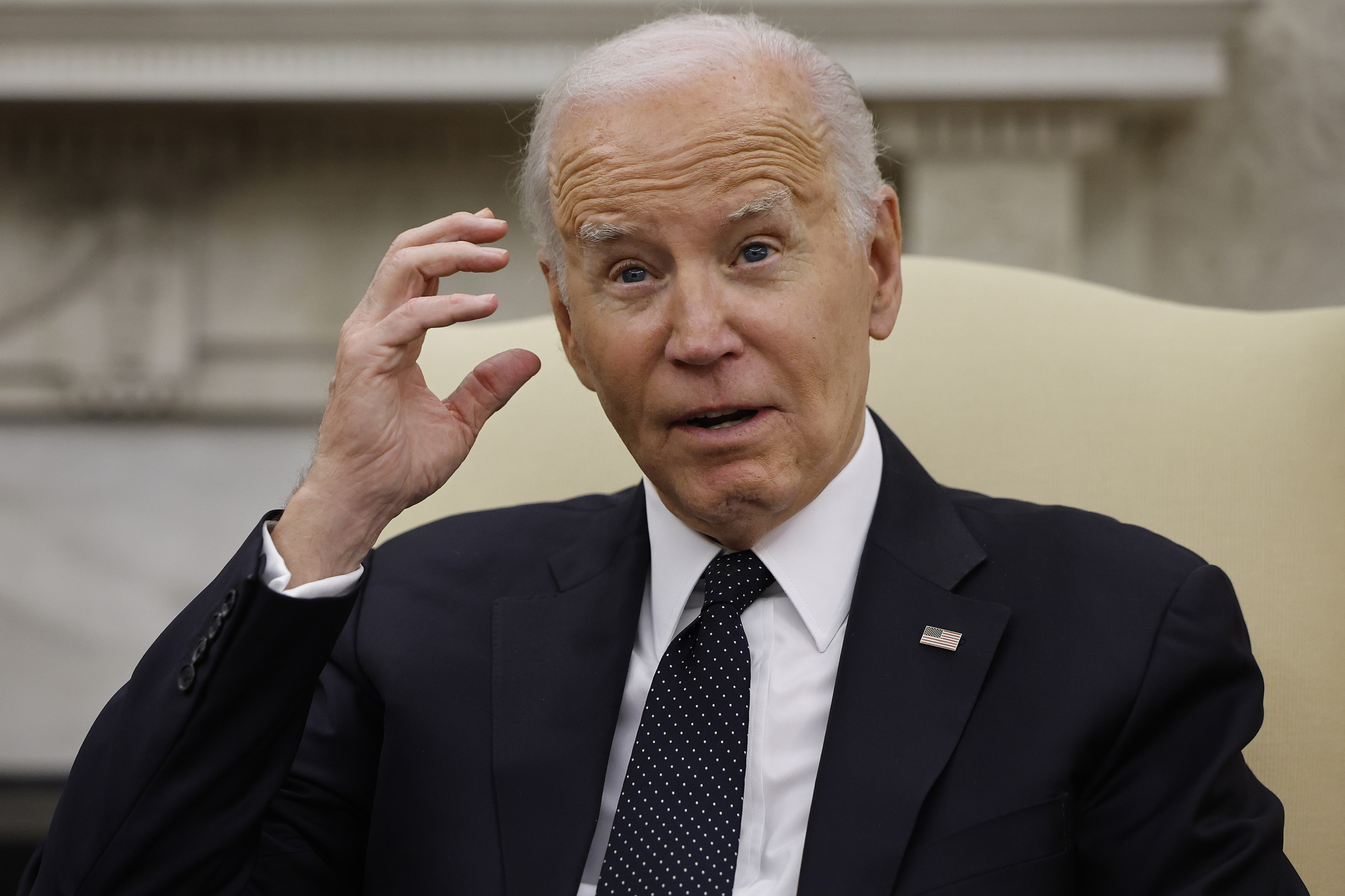The organizers of the annual Eurovision Song Contest have come under fire as calls to ban Israel or to boycott the competition increase.
Critics slammed Eurovision for publishing an "Israel at Eurovision" frequently asked questions page on its website to address the controversy. Israel will be represented in this year's competition by 20-year-old Eden Golan.
Some of the questions on the page include, "Why is Israel in the Eurovision Song Contest?" "Will there be more security than usual this year, because of the fact Israel is competing?" and "Why is Israel still a Member of the EBU (European Broadcasting Union) when Russia was suspended?"
Eurovision is run by the EBU and to participate in it a country needs to be a member of the union and have a state broadcaster, such as the BBC in the United Kingdom, to participate.

There has been a campaign to bar Israel from May's competition over its ongoing military campaign in the Gaza Strip. More than 33,200 people have been killed by Israel in the Palestinian territory since October 7, according to the latest figures published by the Associated Press from the Hamas authorities there.
Israel invaded Gaza after Hamas attacked southern Israel killing around 1,200 people and kidnapping more than 200. Of those taken, 36 hostages have died and around half of the original number have been returned.
Eurovision told Newsweek it chose to publish the FAQ page because it was a "transparent media organization and wished to address the many questions being asked regarding Israeli participation in this year's event."
Newsweek also contacted OEGC Israel—an Israeli Eurovision fan group— and Israel's state broadcaster Kan by email for comment.
The EBU doubled down on its decision to allow Israel to compete, despite weeks of negotiation over the Israeli entry's lyrics, which were deemed "too political."
Israel agreed to change the name of the song from "October Rain" to "Hurricane" as Eurovision organizers felt the original title was a clear reference to the Hamas attacks on October 7, per Reuters.
The original lyrics included "There's no air left to breathe," which seemed to reference people forced to take shelter in cramped conditions during the Hamas attacks, and "They were all good children, each one of them," potentially alluding to children killed in the attacks, and also party-goers at the Supernova festival where Hamas killed 256 people.
The updated lyrics include "Every day I'm losing my mind" and "I'm still broken from this hurricane."
Golan has defended the song's content.
"I think the message is clear," she told Kan in March. "It's about a woman who is going through a personal crisis—a hurricane."
Israel's Culture and Sports Minister Miki Zohar said the EBU's requests to change the song's lyrics were "scandalous."
"Israel's song, which will be performed by Eden Golan, is a moving song that expresses the feelings of the people and the country these days, and is not political," he told Kan. "I call on the union European broadcasting to continue to act in a professional and neutral manner and not to let politics affect art."
Stella Swain from advocacy group the Palestine Solidarity Campaign slammed Israel's continuing participation in Eurovision as "shameful."
"Hypocrisy and amorality are at the heart of the European Broadcasting Union's decision" Swain told Newsweek. "The EBU swiftly banned Russia from participating over its invasion of Ukraine, and yet it attempts to persuade us that Israel, as an apartheid state that is currently carrying out a genocide in Gaza, is fit to take part and present itself as a regular member of the international community.
"This is the epitome of culture-washing, using music and entertainment to launder the reputation of a country that has killed at least 34,000 men, women and children in six months. The EBU is shamefully showing that it does not value Palestinian life."
After the EBU released the Israel FAQ page on its website, many took to social media to criticize the move.
"What even is this FAQ page???" wrote @des__cribe on X, formerly Twitter, on Tuesday. "It didn't even answer the questions at all 😭😭 JUST SAY THAT MONEY IS THE REASON YOU CAN'T LET GO OF ISRAEL…idk how eurovision managed to create an even bigger PR disaster out of a PR campaign that was intended to defuse the situation."
Another person, @wildnessgrows, added: "if you need a whole FAQ page about why israel is competing in eurovision then maybe israel shouldn't be competing in eurovision 🫥"
And @davidFalexander posted: "my kink is watching the EBU's mental gymnastics in trying to explain how Israel hasn't brought the contest into disrepute (ban-able offence) while simultaneously publishing a list of 6 faq's about why they are allowed to compete at #eurovision."
my kink is watching the EBU’s mental gymnastics in trying to explain how Israel hasn’t brought the contest into disrepute (ban-able offence) while simultaneously publishing a list of 6 faq’s about why they are allowed to compete at #eurovision
— David Alexander (@davidFalexander) April 10, 2024
Some of the questions on the FAQ addressed why Israel was still allowed to compete but Russia was not.
"As a non-political organization, the EBU's role is to support public service broadcasters throughout Europe and the Middle East," it wrote. "The Israel public service broadcaster has been a member of the EBU for over 60 years. The Russian public service broadcasters had their EBU membership suspended in 2022 due to consistent breaches of membership obligations and the violation of public service media values."
Another question that caught people's attention was the EBU's response to calls for a boycott of Eurovision 2024.
"We understand the concerns and deeply held views around the current conflict in the Middle East but the Eurovision Song Contest's values of universality, inclusivity and celebrating diversity through music have never been more important…We look forward to being 'United By Music' again this year," it wrote, referencing this year's theme.
Swain said Eurovision's theme cannot apply to this year's contest "when one of the countries taking part is committing a genocide—which is the simple moral conclusion drawn by millions of music fans around the world who have joined the Palestinian call for a boycott of this year's Eurovision."
Eurovision began in 1956 and has become a global phenomenon. The 2023 contest had 162 million TV viewers in 39 markets and 75 million on YouTube alone. The 37 songs had a combined total of 808 million streams and it made $853 million (€795 million) in ad-value, according to the EBU's audience report.
The issue of banning countries from competing has recently been a murky one with many pointing out perceived flaws in the EBU's impartiality.
Russia was booted out in 2022 after it launched its full-scale invasion of Ukraine. But in 2016 when it annexed Crimea, Ukraine won the contest with the song "1944," a very thinly veiled reference to the historical deportation of Crimean Tatars from the region, which many said violated the EBU's "non-political" song lyrics rule.
Russia's contestant in 2017, Yuliya Samoylova, was banned from entering host nation Ukraine because she had performed in Crimea after its annexation by Moscow. As a result, Russia demanded a Eurovision boycott.
Prior to that in 2009, Georgia was not allowed to participate because the EBU ruled its song "We Don't Wanna Put In" was a jab at Russian President Vladimir Putin.
There are other instances of countries being allowed to compete despite being engaged in wars, such as Azerbaijan and Armenia, who have clashed over the Nagorno-Karabakh region.
Lebanon wanted to enter Eurovision in 2005 but later withdrew because it would have been forced to broadcast Israel's entry, thereby violating the Middle Eastern country's laws.
Update 04/11/24, 05:40 a.m. ET: This article has been updated with further information.
Update 04/11/24, 08:45 a.m. ET: This article has been updated to include quotes from Eurovision and Stella Swain of the Palestine Solidarity Campaign.
Uncommon Knowledge
Newsweek is committed to challenging conventional wisdom and finding connections in the search for common ground.
Newsweek is committed to challenging conventional wisdom and finding connections in the search for common ground.
About the writer
Shannon Power is a Greek-Australian reporter, but now calls London home. They have worked as across three continents in print, ... Read more
To read how Newsweek uses AI as a newsroom tool, Click here.






